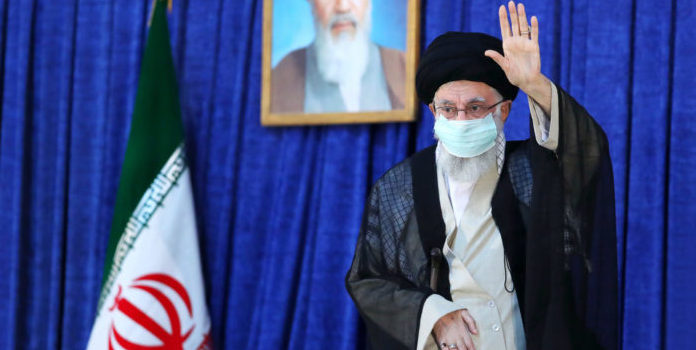(Headline USA) The Biden administration has cleared the way for Iran to unleash a wave of new terrorism against Israeli and U.S. interest in the Middle East after giving $6 billion in frozen assets back to the rogue regime—a top sponsor of terrorist organizations including al-Qaeda, which organized the 9/11 terrorist attacks 22 years ago on Monday.
In return, Secretary of State Antony Blinken hoped to secure the release of five American citizens detained in Iran. As part of the deal, the administration has agreed to release five Iranian citizens held in the United States.
To some extent, the agreement appeared yet another echo of Biden’s presidential mentor, Jimmy Carter, whose political fate was sealed by an Iranian hostage crisis that the incoming Reagan administration successfully negotiated without resorting to any such lopsided quid pro quo agreements, underscoring a new era of diplomacy through strength.
In addition to its usual sponsorship of terrorism, Iran also has become a close ally recently of global adversaries including Russia and China. It is one of six countries slated to join the BRICS alliance in January 2024, which will give the hostile axis control over much of the oil-producing world.
Blinken signed off on the sanctions waivers late last week, a month after U.S. and Iranian officials said an agreement in principle was in place. Congress was not informed of the waiver decision until Monday, according to the notification, which was obtained by the Associated Press.
The outlines of the deal had been previously announced and the waiver was expected. But the notification marked the first time the administration said it was releasing five Iranian prisoners as part of the deal. The prisoners have not been named.
The waiver drew criticism of President Joe Biden from Republicans and others who say the deal will boost the Iranian economy at a time when Iran poses a growing threat to U.S. troops and Mideast allies.
Sen. Chuck Grassley of Iowa said “it’s ridiculous for US to be blackmailed into paying $6B for hostages which will help indirectly finance the number 1 foreign policy of Iran: terrorism.”
Sen. Tom Cotton of Arkansas accused Biden of “paying ransom to the world’s worst state sponsor of terrorism.”
Another Iran hawk, Sen. Ted Cruz, R-Texas, said the waivers were a sign the administration was secretly pursuing a broader deal with Iran to include more than the release of the detainees.
“Today’s news confirms there has already been a side deal including a $6 billion ransom and the release of Iranian operatives,” Cruz said in a statement.
The White House pushed back on all criticism of the waiver decision, claiming it was only a “procedural step” aimed at fulfilling the tentative agreement reached with Iran in August.
“What is being pursued here is an arrangement wherein we secure the release of 5 wrongfully held Americans,” said Adrienne Watson, a spokeswoman for the National Security Council. “This remains a sensitive and ongoing process. While this is a step in the process, no individuals have been or will be released into U.S. custody this week.”
The waiver means that European, Middle Eastern and Asian banks will not run afoul of U.S. sanctions in converting the money frozen in South Korea and transferring it to Qatar’s central bank, where it ostensibly will be held for Iran to use for the purchase of “humanitarian” goods.
Iran has long claimed that yellow-cake uranium is just such a humanitarian commodity since its nuclear program is for the peaceful development of clean energy and nothing else. The country was believed to have been just weeks away from development of an atomic bomb at the start of Biden’s administration, leaving its current status uncertain, though no tests of one have been made public.
Due to numerous U.S. sanctions on foreign banks that engage in transactions aimed at benefitting Iran, several European countries had balked at participating in the transfer. Blinken’s waiver is aimed at easing their concerns about any risk of U.S. sanctions.
The sanctions waiver applies to banks and other financial institutions in South Korea, Germany, Ireland, Qatar and Switzerland.
“I determine that it is in the national security interest of the United States to waive the imposition of sanctions … with respect to foreign financial institutions under the primary jurisdiction of Germany, Ireland, Qatar, the Republic of Korea, and Switzerland that are notified directly in writing by the U.S. government, to the extent necessary for such institutions to engage in transactions occurring on or after August 9, 2023,” Blinken wrote.
Sanctions waivers apply to transactions involving previously penalized entities such as the National Iranian Oil Company and Central Bank of Iran “ to transfer funds from accounts in the Republic of Korea to accounts in Switzerland and Germany and from accounts in Switzerland and Germany to accounts in Qatar, and to use the transferred funds for further humanitarian transactions in accordance with written guidance from the U.S. Government,” he wrote.
The American prisoners include Siamak Namazi, who was detained in 2015 and was later sentenced to 10 years in prison on internationally criticized spying charges; Emad Sharghi, a venture capitalist sentenced to 10 years; and Morad Tahbaz, a British-American conservationist of Iranian descent who was arrested in 2018 and also received a 10-year sentence. The fourth and fifth prisoners were not identified.
“To facilitate their release, the United States has committed to release five Iranian nationals currently held in the United States and to permit the transfer of approximately $6 billion in restricted Iranian funds held in (South Korea) to restricted accounts in Qatar, where the funds will be available only for humanitarian trade,” Blinken wrote.
People familiar with negotiations said they expect the detainees will be released as early as next week.
Adapted from reporting by the Associated Press

